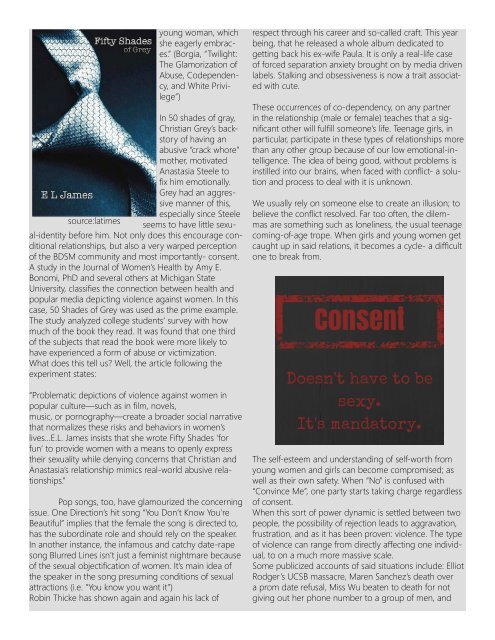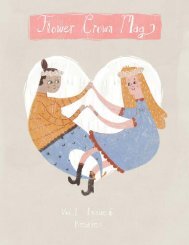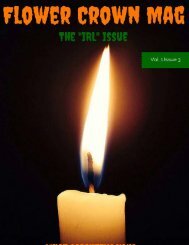Flower Crown Magazine: Issue 2
The Celebrity Skin Issue flowercrownmag.com
The Celebrity Skin Issue
flowercrownmag.com
You also want an ePaper? Increase the reach of your titles
YUMPU automatically turns print PDFs into web optimized ePapers that Google loves.
young woman, which<br />
she eagerly embraces.”<br />
(Borgia, “Twilight:<br />
The Glamorization of<br />
Abuse, Codependency,<br />
and White Privilege”)<br />
In 50 shades of gray,<br />
Christian Grey’s backstory<br />
of having an<br />
abusive “crack whore”<br />
mother, motivated<br />
Anastasia Steele to<br />
fix him emotionally.<br />
Grey had an aggressive<br />
manner of this,<br />
especially since Steele<br />
source:latimes<br />
seems to have little sexual-identity<br />
before him. Not only does this encourage conditional<br />
relationships, but also a very warped perception<br />
of the BDSM community and most importantly- consent.<br />
A study in the Journal of Women’s Health by Amy E.<br />
Bonomi, PhD and several others at Michigan State<br />
University, classifies the connection between health and<br />
popular media depicting violence against women. In this<br />
case, 50 Shades of Grey was used as the prime example.<br />
The study analyzed college students’ survey with how<br />
much of the book they read. It was found that one third<br />
of the subjects that read the book were more likely to<br />
have experienced a form of abuse or victimization.<br />
What does this tell us? Well, the article following the<br />
experiment states:<br />
“Problematic depictions of violence against women in<br />
popular culture—such as in film, novels,<br />
music, or pornography—create a broader social narrative<br />
that normalizes these risks and behaviors in women’s<br />
lives…E.L. James insists that she wrote Fifty Shades ‘for<br />
fun’ to provide women with a means to openly express<br />
their sexuality while denying concerns that Christian and<br />
Anastasia’s relationship mimics real-world abusive relationships.”<br />
Pop songs, too, have glamourized the concerning<br />
issue. One Direction’s hit song “You Don’t Know You’re<br />
Beautiful” implies that the female the song is directed to,<br />
has the subordinate role and should rely on the speaker.<br />
In another instance, the infamous and catchy date-rape<br />
song Blurred Lines isn’t just a feminist nightmare because<br />
of the sexual objectification of women. It’s main idea of<br />
the speaker in the song presuming conditions of sexual<br />
attractions (i.e. “You know you want it”)<br />
Robin Thicke has shown again and again his lack of<br />
respect through his career and so-called craft. This year<br />
being, that he released a whole album dedicated to<br />
getting back his ex-wife Paula. It is only a real-life case<br />
of forced separation anxiety brought on by media driven<br />
labels. Stalking and obsessiveness is now a trait associated<br />
with cute.<br />
These occurrences of co-dependency, on any partner<br />
in the relationship (male or female) teaches that a significant<br />
other will fulfill someone’s life. Teenage girls, in<br />
particular, participate in these types of relationships more<br />
than any other group because of our low emotional-intelligence.<br />
The idea of being good, without problems is<br />
instilled into our brains, when faced with conflict- a solution<br />
and process to deal with it is unknown.<br />
We usually rely on someone else to create an illusion; to<br />
believe the conflict resolved. Far too often, the dilemmas<br />
are something such as loneliness, the usual teenage<br />
coming-of-age trope. When girls and young women get<br />
caught up in said relations, it becomes a cycle- a difficult<br />
one to break from.<br />
The self-esteem and understanding of self-worth from<br />
young women and girls can become compromised; as<br />
well as their own safety. When “No” is confused with<br />
“Convince Me”, one party starts taking charge regardless<br />
of consent.<br />
When this sort of power dynamic is settled between two<br />
people, the possibility of rejection leads to aggravation,<br />
frustration, and as it has been proven: violence. The type<br />
of violence can range from directly affecting one individual,<br />
to on a much more massive scale.<br />
Some publicized accounts of said situations include: Elliot<br />
Rodger’s UCSB massacre, Maren Sanchez’s death over<br />
a prom date refusal, Miss Wu beaten to death for not<br />
giving out her phone number to a group of men, and







